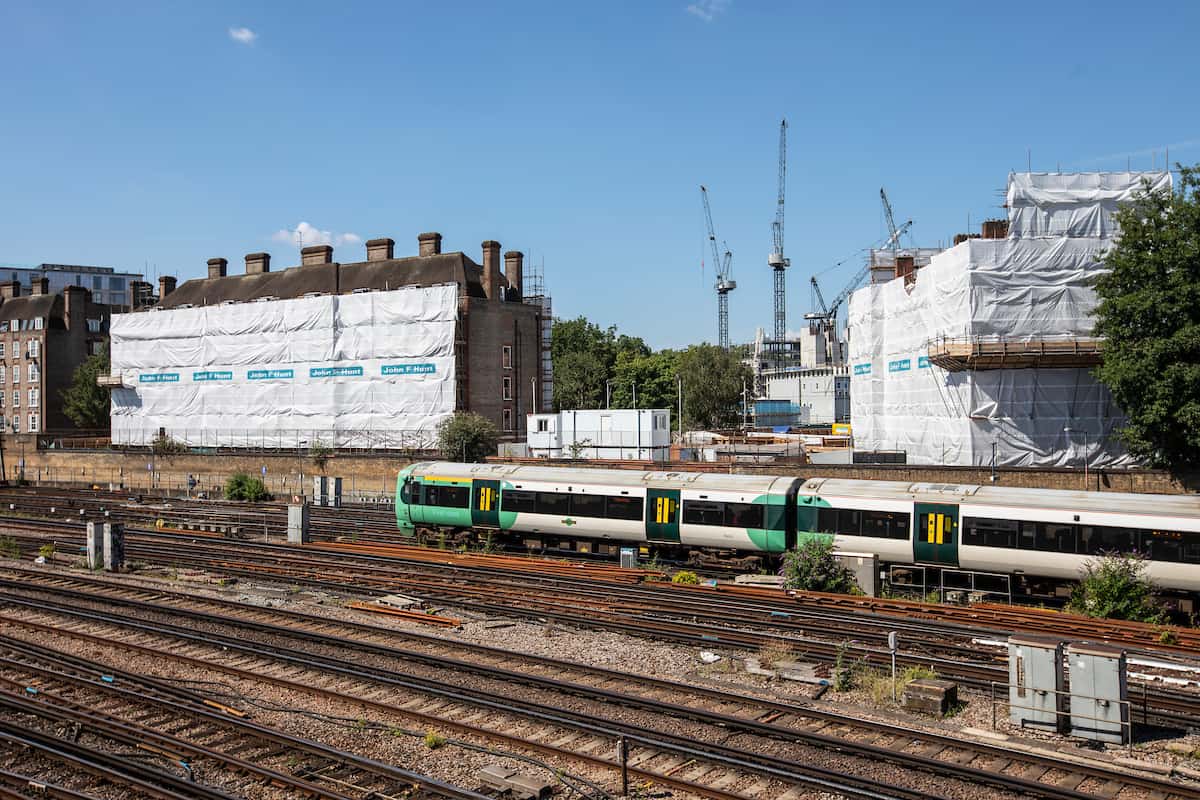Ebury Bridge Estate (Phase 1)
Westminster City Council

69 weeks

£6.6m

City of Westminster
Location & Overview
The demolition of six 4-6 storey traditional load-bearing brick walls and timber structures, including ancillary outbuildings, for the redevelopment of Ebury Bridge Estate (phase 1) into 1,850 new affordable homes. It was the largest and most significant regeneration project in Westminster to date. John F Hunt was employed as Principal Contractor to plan, manage and coordinate the construction phase from the pre-commencement through to handover.
Work, Challenges & Solutions
We undertook asbestos surveying and removal, erection, maintenance, and movement of hoarding and temporary works; service isolations; installation and maintenance of temporary services; soft strip and demolition of six mid-rise housing blocks and associated ground works across the estate.
The works were split into 5 distinct phases due to vacant possession dates. Therefore, whilst undertaking works within the first tower block, residents were living within the adjacent property. This, combined with the operational Network Rail (NWR) lines and assets close by, meant the site was extremely congested, requiring careful planning and execution to ensure safe delivery with minimal disruption to the local community.
The planning phase was approximately 8 weeks before commencing on site, in which time we undertook the following key activities: stakeholder engagement and liaison, preparation of written project documentation, 3rd party approvals from key stakeholders, surveys and investigations before the works commencing, for asbestos, services, and structural areas, preparation of social value initiatives, local procurement, training, and back-to-work schemes and the design of temporary works, i.e. scaffolding, hoarding, propping for demolition, and earthwork support systems.
Due to Covid -19, the installation of appropriate welfare facilities and site security needed to be upgraded in line with our bespoke Covid -19 Emergency Response Plan.
Working within a congested site near residents, special measures were required with advance notice being given of disruptive activity, minimising our impact on the busy surrounding roads, with delivery times managed online to avoid key hours. A team of trained traffic marshals was always present to liaise with the public, and we coordinated our work with other contractors, utility providers, residents, and our internal subcontractors.
Due to the project’s high-profile nature, we had an extensive liaison with Westminster City Council. The Leader, Cllr Rachael Robathan, David Thompson (Project Director), Ashton Dean (Project Manager), and Martin Crank (Comms) all attended the site regularly to monitor progress.
Hosting a meeting three times a week with WCC, the UKPN Project Manager, the Cadent Gas Project Manager, additional utility providers, and Project Managers from other contractors on site, allows us to coordinate activities and ensure safety.
Following a protected species survey, we identified the presence of bats, so worked collaboratively with Natural England to obtain licensing and develop a programme during the PCSA period, to accommodate the licensing requirements.
Network Rail coordination enabling the approval of methods and designs of the scaffold, temporary works, and demolition adjacent to assets in accordance with the BAPA.
Due to our phasing strategy, the Ebury Lodge charity stall had to be relocated, so we provided them with a new enclosure, set up a temporary water supply, provided welfare, printed their paperwork, gave them use of our vehicles, and provided regular assistance with unpacking deliveries and maintenance.
We appointed a dedicated Community Liaison Officer, who provided residents with 24/7 contact details, weekly updates delivered through newsletters, emails, live media apps, monthly meetings, and door knocks for a chat, as well as contributing to the Ebury Estate weekly newsletter.
Achievements
We actively participated in the ‘Considerate Constructors Scheme’, which recognises and rewards commitment to care, appearance, respect of the community, protection of the environment, and safe operations, and acts as an independent benchmark for performance.
During both the first and second audits, we achieved full marks and were awarded a certificate of excellence. Their representative commented on the 1st audit, “An exceptional effort given the scale of this project at this stage”, and on the 2nd audit “The team demonstrate a continuing social value effort designed and engaged to leave a legacy at a proportionately exceptional level.”
Upon implementation of our Covid safety measures, WCC commended us on our proactive approach and used our measures as a benchmark for other sites within the Borough.
Some of our local initiative achievements during Covid included: construction career-related advice and world of work tours, with 100% of job opportunities within WCC in-house employment service, works to relocate a residential fishpond, use of local labour, local suppliers, and shops, a minimum of 6hrs per month of volunteering provided to local Borough Community, funding for a local decorator to paint St Barnabas School and an artwork competition for the children with artists to decorate the hoarding, worked closely with the Ebury Lodge charity stall that provided food and clothing for locally disadvantaged residents and sponsored and supported the local foodbank (funding, cabin, and welfare provision), assistance with socially distanced resident play-time during the lockdown, including filling paddling pools and providing security for keeping the basketball court open, general assistance for residents, including bin collections, shopping for the elderly, maintenance, and repair to homes, and help with house moving, volunteering programme to provide socially distanced engagement with elderly residents, provision of Wi-Fi in designated public areas, commitment for staff working on site to use public transport to reduce vehicle emissions in the area and the incorporation of bike parking facilities for employees and residents, installation of living green walls within the Borough, staff volunteering to support Ebury/Churchill Ward clean-ups and liaison with the client team and principal designer ensured that all risks were effectively managed and resulted in zero incidents or accidents throughout the project.

